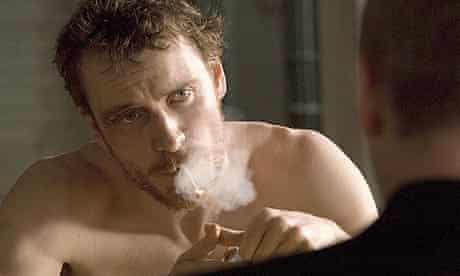Eye For Film >> Movies >> Hunger (2008) Film Review
Hunger
Reviewed by: Emma Slawinski

Film is a tricksy medium for the telling of history. It has a habit of glossing and taking sides and beguiling us with a cut-and-dried fable. Here’s your hero and your villain; here’s your comedy or your tragedy. In Hunger, artist and Turner Prize winner Steve McQueen has dispensed with the airbrushing and the audience-friendly plot; this is no costume-drama. It’s a multi-faceted, original and compelling retelling of one of the bleakest episodes in recent British history. Bobby Sands and his fellow hunger-strikers were both hailed as heroes and martyrs, and defamed as criminals and fanatics. Hunger allows for both possibilities, whilst rewriting the rule-book on storytelling.
Opening with prison officer Raymond Lohan (Stuart Graham) reluctantly preparing himself for work, Hunger looks right across the social landscape; the next character we meet is a young Republican, Davey Gillen (Brian Milligan) entering the Maze and being marched to his cell naked after refusing to wear prison uniform. From here on McQueen plunges us into a world that is unrecognisable. All the prison-movies in the world can’t prepare you for the shocking, raw entry into the degradation and horror of the situation.

Sleeping on a fetid mattress in a bare cell that is festering with rotting food and flies, the inmates paint the walls with excrement and tip out pans of urine into the corridors as part of their ‘dirty protest’; they suffering horrific beatings at the hands of the wardens, who also suffer because they too cannot escape the filth and the violence. McQueen spares no detail in depicting the prisoners’ degradation. In the midst of this sensory onslaught, there are moments of contrasting beauty. A warden cooling off against a white wall, a flurry of snowflakes separating him and the camera. And the scenes that while brutal, are so carefully composed that they carry their own terrifying beauty.
The film begins and ends with little dialogue, which serves all the more to emphasise its explosive central set piece, a long, long take that sees Sands come head to head with the priest Father Moran (Liam Cunningham), who is trying to persuade him to give up the hunger strike. The force and variety of textures the two men bring to the scene is astonishing. Compared by McQueen to a showdown in the boxing ring, the exchange is tactical and full of rhetorical punches; Fassbender and Cunningham’s sparring is mesmerising to watch.
At one point in the conversation Sands seems to compare himself to Christ, but in McQueen and Fassbender’s hands he is more warrior and iconoclast than martyr. Though the steely, intransigent voice of Margaret Thatcher ringing out over footage in the jail sways our sympathy towards the Republicans, it’s hard to reconcile yourself to their actions. After a vicious beating at the hands of the guards, we see Sands pushed back into his cell, and lying on the floor his bloody face turns into a fierce and determined smile. It says that the pain is nothing, because he is part of history, and he is absolutely certain of his role. It’s a chilling moment, and even without the poweful dialogue scene, this frame alone could convey the contradictions that he embodies.
In directing Hunger Steve McQueen has achieved something quite exceptional: a debut film that displays an artist and photographer’s sensibilities while building a story that draws you in and takes you to the heart of a historical period, even with a scant plot and little dialogue. It’s not a film that most people will be able to stomach twice, but if you’re interested in history, or just interested in humans, seeing Hunger once is essential.
Reviewed on: 08 Oct 2008


















